Distinguished Critique: "Superman: For the Man Who Has Everything" Review
This classic annual pits Superman against his soul's desire, showcasing the struggle of a hero versus the heart
—by Nathan on August 5, 2023—
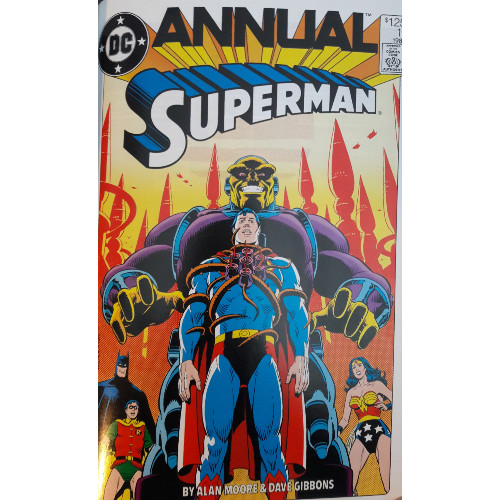
Judy Garland said it best: “There’s no place like home.”
The phrase, iconic though perhaps cliche, undergirds a strong, fundamental idea: there really is no place quite as comfortable or familiar as a home. You know it every time you sleep in a hotel room: the sheets and pillows aren’t quite the same as they are in your bed, aren’t they? You learn the grooves and crannies of a lived-in space. You recognize footfalls by how they creak on the stairs. You know the perfect hiding spot for Christmas presents.
Superman has never had much of a chance to know his real home intimately. As an infant, Kal-El was placed in a rocketship by his father Jor-El and blasted from the planet Krypton immediately before its destruction. His whole life, he’s known nothing but Earth and farmlands and steel cities…sure, he’s gone to space, but the place where he was born, the home planet where he could have been raised if Krypton hadn’t unceremoniously imploded…well, it’s all gone, isn’t it? Earth’s his adopted home, for sure, but one could argue it’s like Supes is living in a hotel never knowing a home before it.
I’m sure, at some point, people have written imaginary stories where Krypton wasn’t destroyed or was found, even if that’s purely an assumption on my part. I do know that Superman has tasted Krypton through the bottled city of Kandor and interacted with other Kryptonians such as his cousin Supergirl.
But what if Krypton hadn’t been destroyed? And what if mainstream, pre-Crisis on Infinite Earths Superman got to see what Krypton would have been like if the planet hadn’t been torn asunder…and Jor-El had never had any reason to jettison his baby boy?
“For the Man Who Has Everything”
Writer: Alan Moore
Penciler: Dave Gibbons
Inker: Dave Gibbons
Colorist: Tom Zuko
Letterer: Dave Gibbons
Issue: Superman Annual #11
Publication Date: September 1985
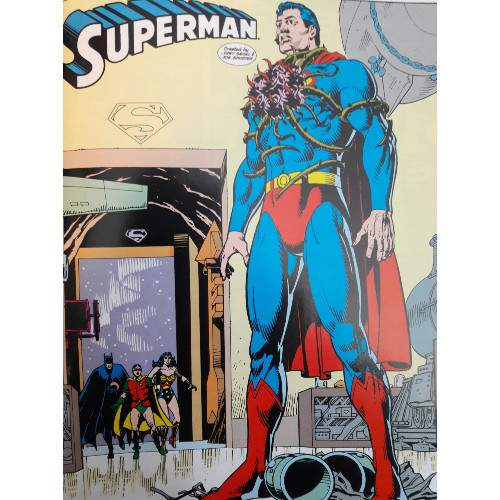
Note: save for some minor edits, this blog is the same as it was when I originally posted it to Hubpages
What sets “For the Man Who Has Everything” apart from the potential imaginary stories I outlined above is that this isn’t imaginary. Written as one of the last Silver Age Superman stories (along with another Alan Moore classic) before Crisis reset the DC Universe (okay, well, then, I guess it is imaginary, but let’s go by pre-Crisis continuity for a moment), this annual considers the fate of Krypton in a more tangible way. This isn’t a “What If-?” style of story that leaves you going, “Aw, shucks, if only Krypton had survived.” No, this story gives the real Superman a real glimpse of what his life could have been like if Krypton had survived.
It’s Superman’s birthday, and Batman, Robin (Jason Todd, but the pre-Crisis, Earth-One version of the ill-fated Boy Wonder), and Wonder Woman show up at the Fortress of Solitude to celebrate. They find the Fortress already open, Superman standing transfixed in the foyer. He’s ensnared by a Black Mercy, given him by alien warlord Mongul. As Superman’s friends battle the evil giant, the Man of Steel stands immobile, wrapped in a simulation of his heart’s desire:
Krypton, whole and flourishing.
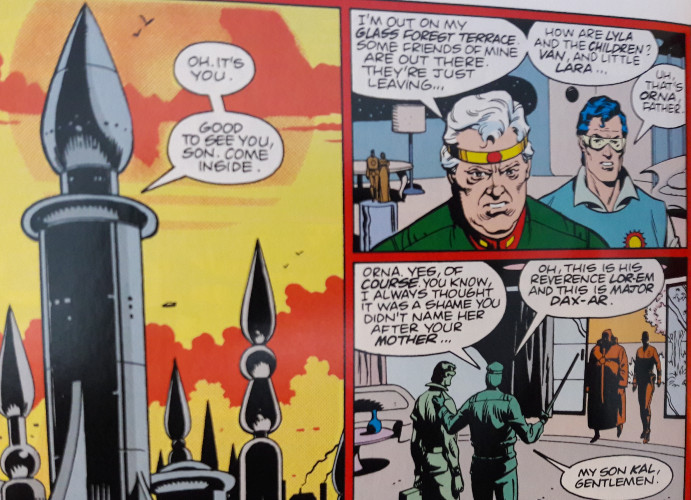
Imaginary but not imaginary. This is the heart of the story as Moore depicts it. He and Gibbons craft a Krypton that’s right in Superman’s grasp, that as far as he can tell, is tangible and alive. He’s no longer a colorfully-clad hero who bops Bizarro or Brainiac in the face; he’s Kal-El, the man he should have been from the start. He’s married to a Kryptonian woman, has a son, interacts with his cousin Kara and his father, Jor-El, in a way he never was able to. This is how life was meant to be. And in his mind, it’s all real…it’s all the reality he’s ever known. And yet none of it is real.
The notion is a brilliant way of getting into Superman’s innermost thoughts and desires without him verbalizing them to the audience. Moore’s Superman is a far cry from John Byrne’s interpretation of the hero in his post-Crisis Man of Steel limited series. That series ended with Superman discarding his Kryptonian heritage in favor of his Earthly (specifically American) upbringing. It’s an ending I find bizarre and frustrating, as I believe the character works better as a bridge between two worlds. Though Moore’s interpretation sees an emphasis on Superman’s longing for Krypton, Superman’s simulated homeworld experiences fractures from almost the get-go.
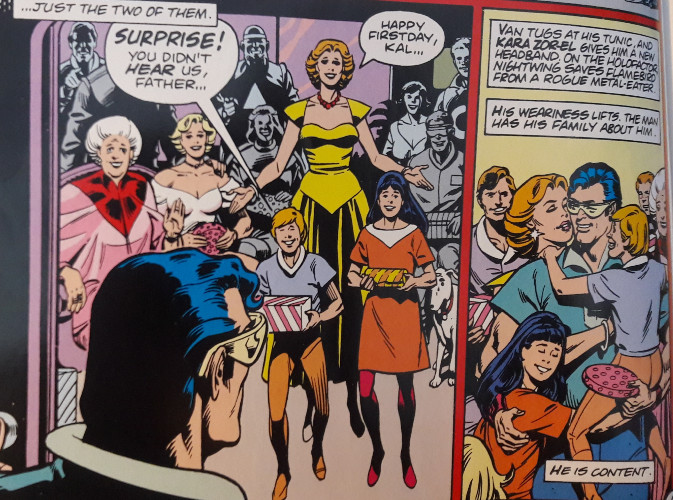
Moore makes it clear that Superman desperately misses the world he’s never known, and that given the right circumstances, he would have preferred to live on an unshattered Krypton. Like I said, the way life was meant to be. Yet this brushes up against another core characteristic–the heroic, sacrificial way Superman was raised and has acted over the years. Moore envisions this duality spectacularly. Superman’s greatest dream fighting against his inherent heroism, the part of him which knows, deep down, his vision of Krypton isn’t real and that he’ll have to sacrifice a life of pretended happiness to embrace reality.
Elsewhere, Moore uses his other cast members engagingly. He paints Wonder Woman as one of Superman’s most staunch allies, giving her a valiant fight against Mongul that rages through the Fortress of Solitude. When Mongul glibbly refers to her as Superman’s “mate,” Diana shrugs off the comment (“just…good…friends”) but leaving enough space for interpretation to make me wonder (no pun intended) as to Earth-One’s Wonder Woman’s true feelings towards Superman.
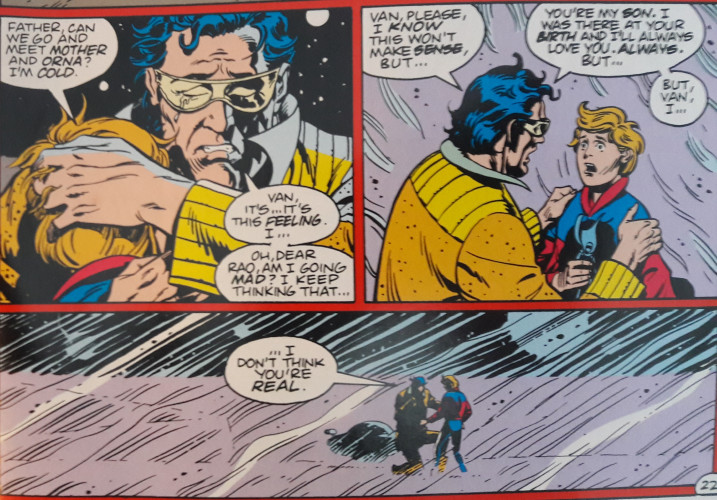
Batman becomes entangled in the Black Mercy at one point, and we get a brief look into a world where his parents are never killed by the mugger in Crime Alley. His vision doesn’t last nearly as long as Superman’s, but even this small glimpse works well to characterize Batman. Both he and Superman, at their core, wish for worlds where their greatest losses never happened. It connects the two in a way I had not thought of before (and certainly works a lot better than having their mothers share the same first name): both heroes are made who they are through the tragedies they endured.
Robin is perhaps my favorite character in the whole issue. He proves himself against Mongul, surprisingly, overturning an earlier statement made by the warlord regarding humanity’s intellect. This is, to me, the Jason Todd we should have always received instead of the punk later killed off by Jim Starlin. Very little of that brash, arrogant teenager exists in this story. Instead, we get a wide-eyed Robin, newly brought into this realm of superheroism. This is his first time visiting the Fortress of Solitude, perhaps his first time meeting Wonder Woman, and definitely his first time facing a monster like Mongul. For his stature, particularly when compared to Superman or Wonder Woman, the Boy Wonder holds his own surprisingly well.
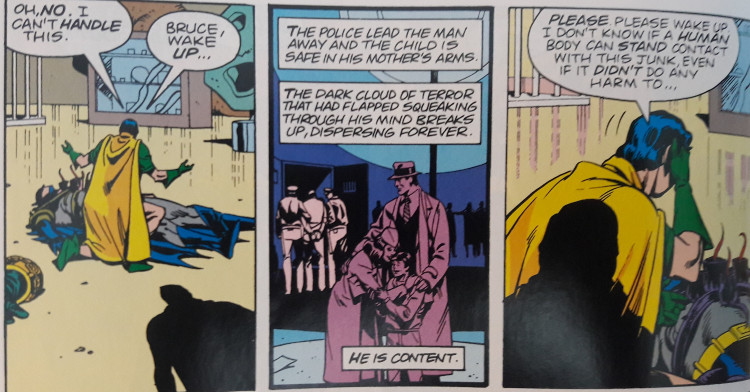
It strikes me that, in writing this story, Moore delivers Superman a loss the Man of Steel has no recollection of experiencing: the death of Krypton. Superman, naturally, is aware of his planet’s demise; without that understanding, this narrative wouldn’t be as impactful, nor do I think that a thriving Krypton would be Superman’s heart desire if he wasn’t aware of what he never had. But though Superman may have wished to be a part of a fully-realized Krypton, he never experienced the tragedy of losing the planet. Through Mongul, he does. When Superman is awakened from the Black Mercy’s grasp, he’s rightfully peeved at Mongul. The alien warlord falsely resurrects a dead planet and gives it to the Man of Steel. Once that loss becomes apparent, Superman deals with the tragedy of losing Krypton, really, for the first time.
“For the Man of Who Has Everything” is an annual packed with wonderful characterization. “What do you get for the man who has everything?” the question often goes. Moore weaves the bitterness of that notion throughout the story. What more would a Superman want than what he’s given by the Black Mercy’s simulation? But what if the “everything” he already has isn’t real? Perhaps more accurately, as the ending of the issue draws near, the question pivots: as Superman wakes from his imposed hallucination, perhaps you’re meant to wonder, “What do you get for the man who’s lost everything?
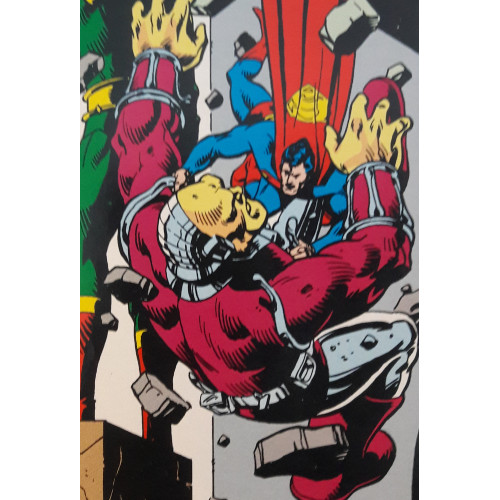
Amusingly, as the annual closes, Wonder Woman and Batman reveal they’ve brought birthday gifts closely related to the events of the story…and as considerate as they are, they’re just unable to fill the hole in Superman’s chest he may have never completely realized was there from the start.